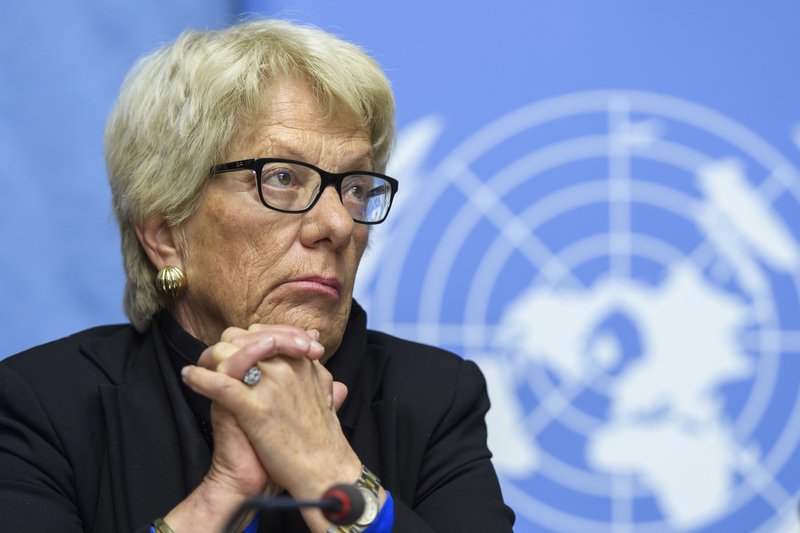UNITED NATIONS -- Secretary-General Antonio Guterres supports the work of the United Nations' independent Commission of Inquiry on Syria in gathering evidence of alleged crimes against civilians during the 6½-year civil war and regrets the resignation of Carla del Ponte, the U.N. said Monday.
Del Ponte announced she was resigning from the commission in frustration at the Security Council's inaction to hold criminals accountable in war-battered Syria, where she said "everyone is bad." In comments published Sunday by the Swiss magazine Blick, she criticized President Bashar Assad's government, his opponents and the international community.
U.N. spokesman Stephane Dujarric said the secretary-general considers accountability "critical" and "supports the continued work of the commission as an important and integral part of the accountability process."
As for del Ponte, he said Guterres "is grateful for her service and her contribution to the important work of the commission, also as a tireless advocate for the cause of accountability throughout her career."
Del Ponte, who gained fame as the prosecutor for the international tribunals that investigated atrocities in Rwanda and Yugoslavia, has repeatedly decried the Security Council's refusal to appoint a similar court for the Syrian conflict.
Permanent members Russia, a key backer of Assad's government, and ally China vetoed a U.N. resolution in May 2014 to refer the situation in Syria to the International Criminal Court, the world's permanent war crimes tribunal.
Dujarric said "the commission will continue its work" and questions about a replacement for del Ponte should go to the Human Rights Council and the remaining commission members.
He stressed that accountability takes time.
"Information needs to be gathered in a way that will stand up wherever and whatever circumstances people will have to face justice," Dujarric said. "It's something we can understand is deeply frustrating to the victims first and foremost."
With Security Council action blocked, the U.N. General Assembly, where there are no vetoes, voted last December to establish an investigative body that will assist in documenting and prosecuting the most serious violations of international law in Syria, including possible war crimes and crimes against humanity.
Dujarric noted that the new head of this body, French judge Catherine Marchi-Uhel, who was the ombudsman considering appeals by individuals and entities subject to U.N. sanctions for links to al-Qaida and the Islamic State extremist group, starts work today.
"It is no secret to anyone that the deadlock in the Security Council, I think, has been a source of frustration not only for the secretary-general but for others inside the U.N.," Dujarric said. "There's no getting around the Security Council, and I think we have repeatedly called for greater unity of purpose from Security Council members on the issue of Syria."
Also on Monday, the international chemical weapons watchdog said improved security conditions in Syria will allow its experts to confirm conditions at the last two of 27 facilities where the Syrian government has said it produced chemical weapons.
Ahmet Uzumcu, director-general of the Organization for the Prohibition of Chemical Weapons, said in his latest report that "plans are being made to carry out an inspection to verify the destruction of these two remaining sites."
Syria joined the group in 2013, avoiding possible U.S. military strikes after a chemical weapons attack on a Damascus suburb.
Guterres said in a letter to the U.N. Security Council circulated Monday with Uzumcu's report that he is "encouraged" that the security situation now allows safe access to the two remaining sites.
But Uzumcu and Guterres stressed that Syria still needs to clarify a number of outstanding issues about its initial declaration of chemical weapons and precursor ingredients.
Guterres encouraged "timely and good faith cooperation" between the group and the Syrian government, saying "it is imperative that these outstanding issues be resolved."
A Section on 08/08/2017
